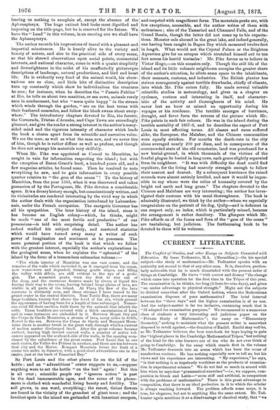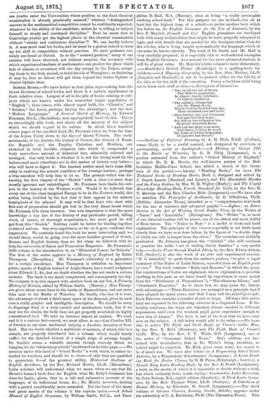CURRENT LITERATURE.
The Conflict of Studies, and other Essays on Subjects Connected with Education. By Isaac Todhunter, M.A. (Macmillan.)—On his special subject—the study of mathematics—Mr. Todhunter speaks with an authority not second to that of any other man. It is, therefore, particu- larly noticeable that he is much dissatisfied with the present order of things at Cambridge. He views " with sorrow and dismay " the change which came into operation for the first time in the Tripos of this year. The examination is, he thinks, too long (it lasts for nine days), and gives an undue advantage to physical strength." Might not the subjects be divided somewhat after the Oxford fashion, where the Moderations examination disposes of pure mathematics ? The brief interval between the "three days" and the higher examination is of no use. And the subject-matter is far too inclusive, containing much that is "ill adapted for examination purposes." We recommend to a numerous class of students a very interesting and judicious paper on the "Private Study of Mathematics "; the essay on "Elementary Geometry," seeking to maintain what the present writer is somewhat disposed to revolt against,—the dominion of Euclid. Euclid they well be, as Mr. Todhnnter believes, the best text-book for boys hoping to gain the "highest places in the.Cambridge Mathematical Tripes," but nothing of the kind for the nine learners out of ten who do not ever think of going to Cambridge. In the essay which stands first in the volume Mr. Todhunter descends into an arena which has been the scene of numberless contests. He has nothing especially new to tell us, but his views and his experience are interesting. " My experience," he says, "is that nothing is so hopelessly worthless as the products of examina- tion in experimental science." We do not feel so much in accord with him when he says that "grammatical exercises"—i.e., we suppose, com- position in Greek and Latin—" seem stiff and artificial, in comparison with the problems of mathematics." There is this great advantage in composition, that there is an ideal perfection in it to which the scholar is always reaching forward. The problem affords some scope, it is true, for elegance, but not to anything like the same extent. Mr. Tod- hunter again mentions it as a disadvantage of classical study, that "we
see youths enter the Universities whose position in the final classical examination is already practically assured," whereas "distinguished success in the mathematical competition cannot be confidently expected, whatever be the ability of the candidate, unless he is willing to subject himself to steady and continued discipline." Does he mean that at Cambridge youths get the highest places in the classical examination without " steady and continuous discipline"? We can hardly believe it. A man must read his books, and he must be a genius indeed to keep up his skill in composition without practice. No such geniuses cer- tainly are found at Oxford. As to the "assured position," many of our readers will have observed, not without surprise, the accuracy with which experienced teachers of mathematics can predict the place which lads of sixteen or seventeen will one day occupy in the Tripes, assign- ing them to the first, second, or third decade of Wranglers ; or declaring, it may be, that no labour will get them beyond the Senior Optime or Junior Optima class.































 Previous page
Previous page